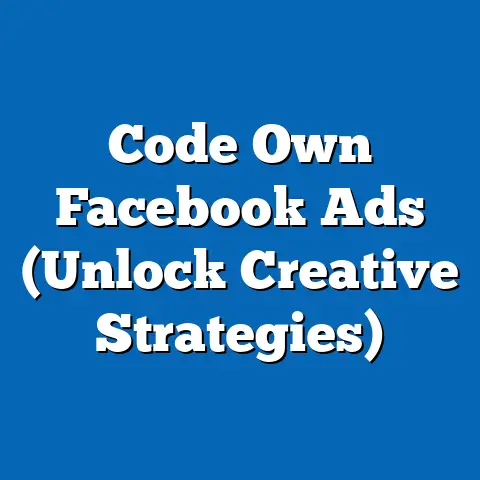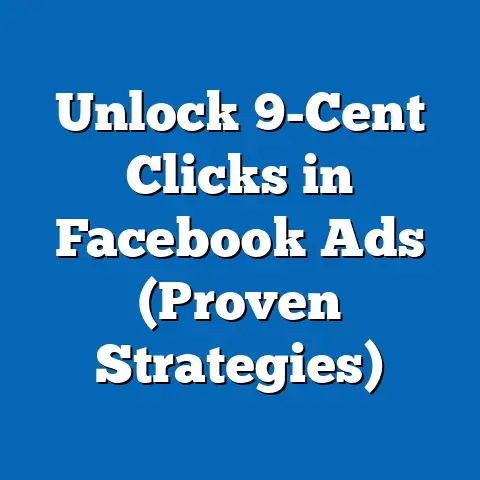Combat Bogus Facebook Ads (Proven Strategies for Success)
Have you ever scrolled through Facebook, enticed by an ad promising unbelievable results for a ridiculously low price, only to find it leads to a dead end or a product that’s nothing like advertised?
You’re definitely not alone.
I’ve seen it happen time and again, both as a user and as someone deeply involved in the world of digital marketing.
In today’s digital landscape, which is frankly overflowing with misleading advertisements, knowing how to navigate the often murky waters of Facebook ads is more crucial than ever.
It’s a wild west out there, and unfortunately, not everyone plays by the rules.
Bogus ads aren’t just annoying; they’re actively harmful.
They erode trust, damage brand reputations, and, worst of all, they can financially devastate unsuspecting consumers.
The sad reality is, these deceptive practices are becoming increasingly sophisticated, making it harder than ever to discern fact from fiction.
What if you could not only spot these deceptive ads with laser-like precision but also protect your business from falling victim to their insidious influence?
This article isn’t just about complaining about the problem; it’s about arming you with the knowledge and strategies you need to win.
I’m going to provide proven strategies that can help you identify, combat, and ultimately succeed despite the challenges posed by bogus Facebook ads.
Let’s dive in and turn the tide!
Understanding the Landscape of Facebook Advertising
Facebook advertising has come a long way since its humble beginnings.
What started as simple banner ads has evolved into a sophisticated ecosystem with advanced targeting options, dynamic ad formats, and powerful analytics.
It’s become an indispensable tool for businesses of all sizes, offering unparalleled reach and the ability to connect with specific audiences based on demographics, interests, and behaviors.
I remember when Facebook ads were practically an afterthought in marketing budgets – now, they’re often the centerpiece of many campaigns!
However, with great power comes great responsibility, and unfortunately, the allure of Facebook’s vast audience has also attracted those with less-than-noble intentions.
Bogus ads proliferate because the platform’s scale and complexity make it challenging to police every single advertisement.
Scammers exploit this, using tactics like:
- Fake testimonials: Creating fabricated reviews and endorsements to build false credibility.
- Counterfeit brand names: Impersonating legitimate brands to trick consumers into purchasing fake products.
- Bait-and-switch tactics: Advertising one product at a low price, then substituting it with a cheaper, inferior alternative.
- Phishing scams: Ads designed to steal personal information or financial details.
- Get-rich-quick schemes: Promises of unrealistic returns on investment with little to no effort.
The impact of these deceptive ads is far-reaching.
For consumers, it leads to financial loss, disappointment, and a growing distrust of online advertising in general.
For legitimate businesses, it can damage brand reputation, erode customer trust, and create an uneven playing field where honest companies struggle to compete with deceptive marketing tactics.
It’s a serious issue that demands attention and proactive solutions.
Identifying Bogus Facebook Ads
- Poor Grammar and Spelling Mistakes: This is often the most obvious red flag.
Legitimate businesses invest in professional copywriting and editing.
Bogus ads frequently contain grammatical errors, typos, and awkward phrasing.
It’s not always a guarantee of a scam, but it’s definitely a reason to proceed with caution.
I always find it amusing, sometimes, because they are so bad! - Unrealistic Promises or Deals That Seem Too Good to Be True: If an ad promises you can “get rich quick” or “lose 20 pounds in a week without exercise,” it’s almost certainly a scam.
Legitimate businesses offer realistic benefits and avoid making outrageous claims.
Remember the old saying: if it sounds too good to be true, it probably is. - Lack of Transparency Regarding the Business or Product: Bogus ads often lack essential information about the company behind them.
Look for a physical address, contact information, and a clear refund policy.
If the ad leads to a website with no “About Us” page or vague contact details, be wary. - Unverified Reviews and Testimonials: While customer reviews can be valuable, bogus ads often feature fake testimonials that are overly positive and lack specific details.
Look for reviews from verified purchasers or independent review sites.
If the reviews sound generic or too good to be true, they probably are. - Pressure Tactics and Urgency: Scammers often use pressure tactics to rush you into making a purchase.
They might claim “limited-time offers” or “only a few items left in stock” to create a sense of urgency.
Legitimate businesses respect your time and allow you to make informed decisions without feeling pressured. - Suspicious Payment Methods: Be cautious if an ad requires you to pay with unconventional methods like gift cards, wire transfers, or cryptocurrency.
Legitimate businesses typically offer secure payment options like credit cards or PayPal, which provide buyer protection. - Request for Personal Information: Be wary of ads that ask for sensitive personal information upfront, such as your Social Security number, bank account details, or passwords.
Legitimate businesses only request information necessary to complete a transaction. - Domain Names and URLs: Always check the domain name and URL of the website the ad leads to.
Scammers often use misspelled domain names or URLs that are similar to legitimate brands to trick users into thinking they are on the real website. - Low-Quality Images and Videos: Bogus ads often use low-resolution images or videos that look unprofessional.
Legitimate businesses invest in high-quality visuals to showcase their products or services. - Inconsistent Branding: Check if the ad’s branding (logo, colors, fonts) matches the legitimate brand’s branding.
Scammers often use inconsistent branding to trick users into thinking they are on the real website.
It’s crucial to approach every ad with a healthy dose of skepticism.
Ask yourself: Does this ad seem legitimate?
Does the offer sound realistic?
Does the company behind the ad seem trustworthy?
By developing your critical thinking skills, you can empower yourself to make informed decisions and avoid falling victim to bogus Facebook ads.
Reporting and Combatting Bogus Ads
Identifying bogus ads is only half the battle.
Once you spot one, it’s crucial to report it to Facebook and take steps to protect yourself and others from falling victim to the scam.
Here’s how to report bogus ads effectively:
- Locate the Three Dots: On the top right corner of the ad, you’ll see three dots (…).
Click on them. - Report Ad Option: A dropdown menu will appear. Select “Report Ad.”
- Choose a Reason: Facebook will ask you why you’re reporting the ad.
Select the reason that best describes the issue, such as “Misleading or Scam,” “False or Deceptive Claims,” or “Spam.” - Provide Details: Facebook may ask you to provide more details about why you’re reporting the ad.
Be as specific as possible.
For example, you could mention that the ad is using fake testimonials, making unrealistic promises, or lacking transparency about the company behind it. - Submit the Report: Once you’ve provided all the necessary information, submit the report.
The more detailed your report, the better chance Facebook has of taking action against the bogus ad.
Don’t hesitate to include screenshots or any other evidence that supports your claim.
Beyond reporting, user awareness plays a critical role in combating bogus ads.
Educate your friends and followers about identifying scams and encourage them to report any suspicious ads they encounter.
Share articles and resources on social media that promote digital literacy and consumer protection.
By working together, we can create a more informed and vigilant online community.
There are also numerous community initiatives and organizations dedicated to digital literacy and consumer protection.
Some examples include:
- The National Cyber Security Centre (NCSC): Provides guidance and resources on staying safe online.
- The Federal Trade Commission (FTC): Offers information on how to spot and report scams.
- The Better Business Bureau (BBB): Provides ratings and reviews of businesses to help consumers make informed decisions.
By supporting these initiatives and organizations, you can contribute to a safer and more trustworthy online environment.
Proven Strategies for Success in Facebook Advertising
In an environment where bogus ads are rampant, it’s more important than ever for legitimate businesses to build a strong brand presence and leverage effective Facebook advertising strategies.
Here are some proven strategies that can help you thrive:
- Building a Strong Brand Presence: Authenticity and transparency are paramount.
Be upfront about your company’s mission, values, and products.
Share your story, showcase your team, and engage with your audience in a genuine and transparent way.
This builds trust and credibility, making it easier for customers to distinguish you from scammers.
I’ve always found that being real with my audience is the best way to build a lasting connection. - Leveraging Customer Testimonials and Case Studies: Showcase real success stories effectively.
Encourage satisfied customers to leave reviews and testimonials.
Feature case studies that demonstrate the tangible benefits of your products or services.
These real-life examples provide social proof and build confidence in your brand. - Utilizing Retargeting and Audience Segmentation: Target the right customers with the right message.
Use Facebook’s retargeting features to reach users who have already shown interest in your products or services.
Segment your audience based on demographics, interests, and behaviors to create personalized ad campaigns that resonate with specific groups.
The more relevant your ads are, the more likely they are to be successful. - Creating High-Quality Content: Invest in compelling visuals and engaging copy.
Use high-resolution images and videos that showcase your products or services in the best light.
Write clear, concise, and persuasive ad copy that highlights the benefits of your offerings.
Avoid making unrealistic promises or using misleading language. - Monitoring and Responding to Comments: Pay attention to the comments on your ads.
Respond to questions, address concerns, and engage in conversations with your audience.
This shows that you care about your customers and are committed to providing excellent service. - Using Facebook’s Ad Policies: Adhere to Facebook’s advertising policies and guidelines.
Familiarize yourself with the rules and regulations to ensure that your ads are compliant and avoid getting flagged or rejected.
The world of Facebook advertising is constantly evolving.
New ad formats, targeting options, and algorithms are introduced regularly.
It’s important to stay up-to-date on the latest trends and best practices to maintain a competitive edge.
I recommend:
- Reading industry blogs and articles: Stay informed about the latest developments in Facebook advertising.
- Attending webinars and conferences: Learn from experts and network with other marketers.
- Experimenting with new features and strategies: Don’t be afraid to try new things and see what works best for your business.
- Analyzing your results: Track your key metrics and use data to optimize your campaigns.
By continuously learning and adapting, you can stay ahead of the curve and maximize your success in Facebook advertising.
Conclusion
Navigating the world of Facebook advertising can feel like traversing a minefield, with bogus ads lurking around every corner.
But with the right knowledge and strategies, you can protect yourself, your business, and your community from falling victim to these deceptive practices.
Remember to:
- Identify bogus ads: Look for the telltale signs, such as poor grammar, unrealistic promises, and lack of transparency.
- Report suspicious ads: Use Facebook’s reporting feature to flag bogus ads and help the platform take action.
- Educate others: Share your knowledge with friends, family, and followers to raise awareness about scams.
- Build a strong brand presence: Focus on authenticity, transparency, and customer satisfaction.
- Leverage effective advertising strategies: Utilize retargeting, audience segmentation, and high-quality content to reach the right customers.
As you move forward in your Facebook advertising efforts, I encourage you to take proactive steps to protect yourself and your community.
Share this knowledge with others, report suspicious ads, and support initiatives that promote digital literacy and consumer protection.
The future of advertising on social media depends on our collective vigilance.
By working together, we can create a more trustworthy and transparent online marketplace where legitimate businesses can thrive and consumers can make informed decisions.
So, let’s be the change we want to see in the digital world and pave the way for a brighter, more honest future for Facebook advertising.






